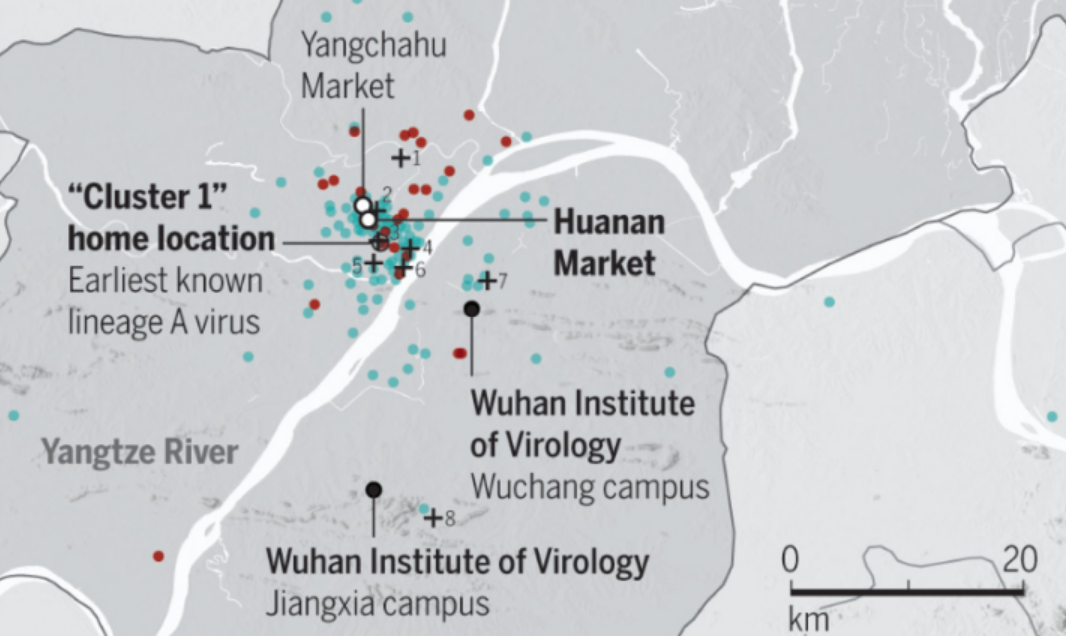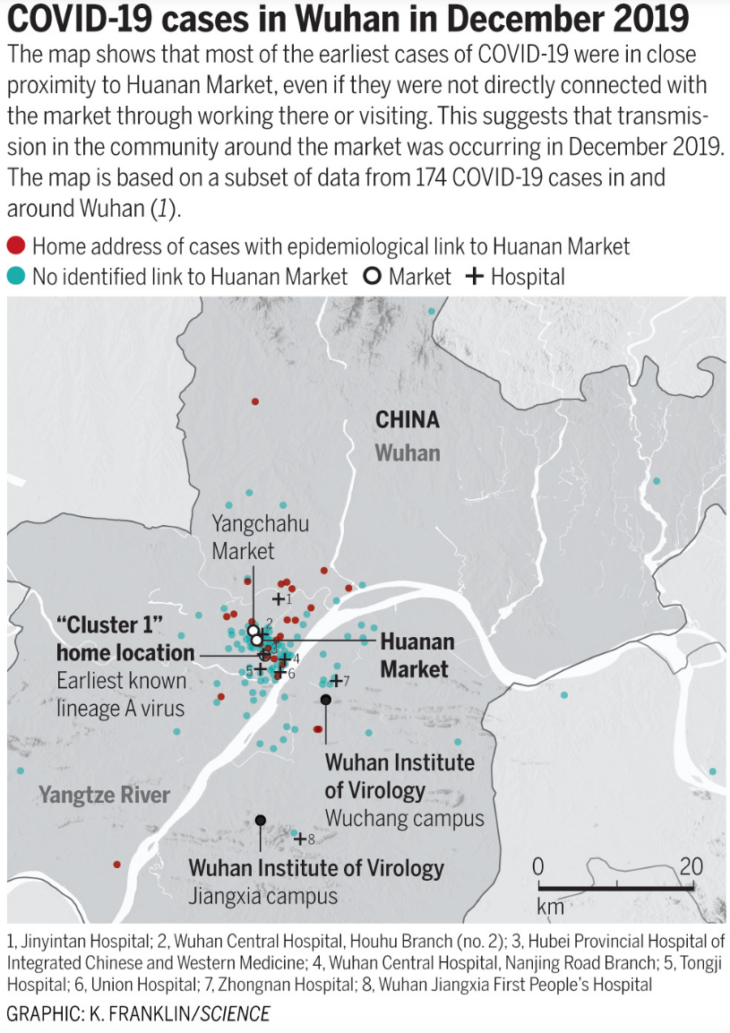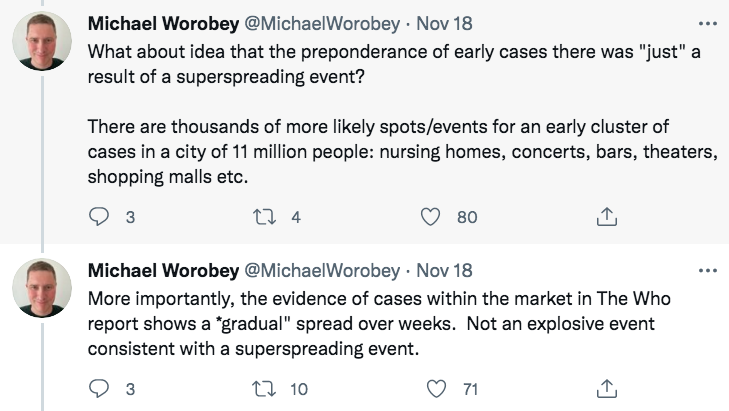
In the early 2000s, the US government exaggerated evidence in favor of an active Iraqi nuclear weapons program in order to whip up war hysteria. There is increasing evidence that in 2020 the US government exaggerated evidence for a “lab leak” being the origin of Covid in order to justify a cold war with China.
A new paper in Science by Michael Worobey provides strong circumstantial evidence that Covid originated at the Huanan animal market in Wuhan, China. The paper showed that previous claims that “patient zero” has no connection with the Huanan market were false, and that the actual earliest known patient was a woman who worked in the market.
The paper also shows that the original cluster of cases was centered on the Huanan market, and that this clustering cannot be due to reporting bias:

Keep in mind that Wuhan is not a unified city like Paris, with a small river running down the middle. The Yangtze is a giant river, roughly a mile across, and Wuhan feels like two separate cities. (I was in Wuhan in mid-2019.) In fact, it was originally multiple cities, Wuchang on one side and Hanyang on the other. The name “Wuhan” was constructed out of those two names, and one other city. As you can see from the map, the famous Wuhan Institute of Virology is about 12 kilometers from the animal market and on the other side of the huge river.
Now of course it is possible that the virus originally spread via a lab leak and the Huanan market was the site of the first “superspreader” event. But that theory has exactly the same problem as lab leak opponents used to justify their claims that a natural origin was implausible. Lab leak proponents once asked, “How likely is it that the virus would first emerge in a Chinese city with a virus research institute?” Worobey turns that argument on its head:

Perhaps Worobey is part of some sort of vast Chinese propaganda effort, which is trying to cover up the origins of Covid. If so, why did Worobey previously sign a letter complaining that the WHO investigation had not taken the lab leak hypothesis seriously enough:
In May, two months after the report by the W.H.O. and China was published, 18 prominent scientists, including Dr. Worobey, responded with a letter in Science complaining that the W.H.O. team had given the lab-leak theory short shrift. Far more research was required, they argued, to determine whether one explanation was more likely than the other.
Lots of lab leak proponents jumped on this letter in support of their claims of a cover-up. And yet Worobey’s Science paper shows that (in at least one respect) the WHO actually gave too much credence to the lab leak hypothesis by wrongly reporting that the first known patient had no links to the Huanan market.
Ironically, the Chinese government may have encouraged lab leak speculation with a clumsy attempt to downplay the animal market hypothesis. The previous SARS epidemic began in a Chinese animal market (in 2003), and early in 2020 China received heavy criticism for allowing these markets:
Paul McCartney has called Chinese wet markets “medieval” and blamed them for the spread of coronavirus, using a comparison with the abolition of the slave trade when calling for them to be banned.
So-called “wet markets” in Asia trade in fresh meat and produce, and sometimes feature live animals. (They take their name from the frequently hosed-down floors.) A common theory – though far from confirmed – is that Covid-19 originated in a live animal market in Wuhan, with the disease being transmitted from illegally traded bat or pangolin meat.
These kinds of news reports in the Western media were deeply embarrassing to China, and their government destroyed valuable evidence that might link the animal markets to the pandemic by killing all the animals in the Huanan market.
In a rational world, the animal market theory would be far more embarrassing to China than the lab leak hypothesis. Western countries also have labs doing gain-of-function research, and lab leaks have occurred in the West. But Western countries do not have Chinese style animal markets. My own view is that the Chinese government is partly to blame for the Covid pandemic, but if I were convinced the lab leak theory were true then it would make me less likely to blame China. Therefore I consider this to be an “anti-CCP post”.
So why did the US government use the lab leak hypothesis as a tool for whipping up anti-China hysteria? Perhaps because most people look at the issue in a more emotional way. The term ‘lab leak’ conjures up images from “mad scientist” films, whereas wild animal markets seem like an old Chinese tradition, a part of their culture.
I see the US government’s attempt to promote the lab leak hypothesis as being part of a longstanding tradition going back to the sinking of the Maine, the Tonkin Gulf incident, and the Iraqi WMD fiasco. The more things change, the more they stay the same.
PS. Other so-called “evidence” has been cited for the lab leak hypothesis, such as three WIV workers supposedly being infected with Covid in November 2019, and the “fact” that the virus supposedly looks manmade. Those pieces of evidence have been shot down long ago.

READER COMMENTS
Jon Murphy
Nov 19 2021 at 5:16pm
I think this is going to be one of those cases where it’s important to treat the government as individuals or agencies, rather than a monolith. Perhaps some elements were trying to whip up hysteria about a lab leak. But others, like Fauci, were actively denying it. I’ll grant that I was young during the buildup of the Iraq War (I was a teenager), but I do not recall a divided government there.
Scott Sumner
Nov 19 2021 at 6:47pm
The government was also divided back then.
MarkLouis
Nov 19 2021 at 5:44pm
I have no idea where the virus came from but I find our lack of curiosity a bit shocking. Is every shred of possible evidence available to the world to see? Maybe I’m misinformed but it doesn’t sound like that’s the case. Which is inexcusable for a crisis of this magnitude. I don’t think most people have any particular axe to grind but we want 100% transparency. Why would any Wuhan Institute data be shielded from the world at this point?
Mark Z
Nov 19 2021 at 5:54pm
Your contention that this is more embarrassing than a lab leak assumes that merely that whether one conducts gain-of-function is the sole risk factor in causing a pandemic. If you see a car wreck on the road, you probably wouldn’t say, “we can’t hold it against the driver because everyone drives; it could just as easily have been me.” You might even say, “he was probably drunk or reckless, otherwise he probably wouldn’t have crashed.” That’s the reasoning behind thinking the lab leak is worse. Maybe all gain-of-function research is equally irresponsible, and thus it’s a lottery which lab causes the pandemic, but I see no reason to take that for granted.
Many people – who are not utilitarians – believe that one has a greater responsibility to not to bad things than to prevent others from doing bad things (many believe this about governments to), so I think that’s also why people view a lab leak as reflecting more poorly on the Chinese government. I doubt it has anything to do with mad scientist films; it’s a ‘sin of omission’ vs. ‘sin of commission’ thing.
Scott Sumner
Nov 19 2021 at 6:46pm
I don’t think it makes much sense to view “the Chinese government” as doing the lab work, even if it were a government lab. (Ditto for whether the Wuhan animal market happens to be government owned.) I suspect the Chinese leadership had no idea what sort of research was being done in Wuhan; I doubt Xi Jinping even knew the lab existed.
To be fair, while I am highly critical of the Trump administration, I doubt that Trump even knew that his administration removed the ban on “gain-of-function” research back in 2017, and I would not blame him for that. For better or worse, governments mostly rely on scientists to police themselves. They don’t understand the stuff well enough to do otherwise.
So I see no omission/commission distinction here.
Brian
Nov 20 2021 at 2:39pm
You seem to suggest there was a sin of commission. I think it’s more complicated.
The threat is dangerous in small quantities and invisible to the unaided eye and so it is hard to control. It is the decision to subject such a threat to a process that is part of a research effort that would seem to be a sin of commission. For such a threat, a breach would seem to me to be a sin of omission. It could even be that there are expert opinions that a breach is inevitable if the activity proceeds beyond the short term. For example, consider that even though semiconductors are made in clean rooms and dust and chemical contamination is less of a problem than in the past, it has not been eliminated. This is not a perfect analogy because in the case of viruses the attempt is to keep the contaminant inside and in the semiconductor case the attempt is to keep the contaminants outside.
Matthias
Nov 19 2021 at 10:32pm
I’m not sure an origin in live animal markets would be that embarrassing for the CCP?
Yes, those live animal markets are something the western world doesn’t have anymore. But they are more of a traditional Chinese thing than something specific to CCP policy. The CCP doesn’t mind destroying Chinese traditions when it feels like it. Especially traditions they see as backward.
That they allow traditional wet markets so far perhaps just means that they hadn’t gotten around to banning them yet.
(In Singapore, our wet markets don’t feature life animals. But the same name persists.)
Ken P
Nov 20 2021 at 1:41am
The 6 miles away argument makes no sense to me. China refused to give WHO access to Blood bank samples that could have shown it was present in the fall. If stirring anti China sentiment is the goal they are doing a lousy job. I don’t get that sentiment from any of the lab leak articles or anyone I’ve talked to. Instead blame is squarely pointed at NIH. It took a long time for NIH to finally admit they were conducting GOF research. And when they did the MSM which has become the microphone for the intelligence community ignored it.
If the intelligence community was trying to create that sentiment why not leak the info instead of waiting for FOIAs by the likes of the Intercept? We now know that similar GOF research except that it explicitly included a furan cleavage site was shopped at the defense department by Eco Health Alliance and turned down prior to conducting similar research at Wuhan. We also know that the research involved transgenic mice expressing human ACE2 receptor in lung cells (which is the obvious approach a researcher would use).
The big question is if it came from the market is how did it quickly become so infectious to humans? The number of cycles of mutations in cells with human receptors needed to gain that function is incredible.
If they want to stir up sentiment against China they can get more traction with trade issues, human rights, or Taiwan than the lab leak.
Lysseas
Nov 20 2021 at 10:08am
They used the lab leak story, because to the average person, “lab leak” is translated as: “They (the chinese goverment / military) were experimenting with a virus to use as a biological weapon and they lost control of it”. No gain-of-function details and certainly no begnign motives for the research are assumed.
MikeW
Nov 20 2021 at 1:33pm
To my understanding, the biggest problem with the “natural” (rather than “lab”) hypothesis is that there is no evidence showing infections in animal populations. How did the infected bat get to that market?
Scott Sumner
Nov 21 2021 at 12:55pm
With the first SARS epidemic, the wild animal hosts were not discovered for many years, and when they were discovered the location was far from the site of the outbreak. Unfortunately, this time around the evidence from the wild animal markets was quickly destroyed.
Mark Brady
Nov 21 2021 at 1:32pm
“In the early 2000s, the US government exaggerated evidence in favor of an active Iraqi nuclear weapons program in order to whip up war hysteria.”
“[E]xaggerated evidence” suggests there was some evidence that was exaggerated. What exactly was that evidence?
“[W]hip up war hysteria.” Really? I don’t deny that the Bush administration engaged in nefarious activities, but does this sentence really capture what was going on?
Scott Sumner
Nov 21 2021 at 4:00pm
Of course there was SOME evidence. No one denies that Iraq had a nuclear weapons program; the debate was over whether the program was active. Iraq kicked out the inspectors. That’s a piece of evidence.
Was there persuasive evidence? No.
RJH
Nov 22 2021 at 6:54am
I generally love Scott’s posts but this one falls short. To be fair, though, it is good to point out that the US gov’s willingness to exaggerate to reach desired conclusions has costs that are still with us almost 20 years later.
For anyone interested in Covid19’s origin, I strongly recommend reading Matt Ridley’s (coauthored) new book Viral. I found the authors attempts to provide a balanced picture/conclusion credible, and completed the book much better informed but without a firm conclusion (full disclosure, I initially accepted the wet market as the source of the pandemic and now I give lab accident a maybe 60% probability). There is currently no smoking gun either way – in part, maybe because, the Chinese government has not been forthcoming. All data that gets provided now is suspect given the lack of transparency and observed willingness to lie (and absolutely agree that applies to both governments).
I don’t know whether the Chinese government would prefer we believe natural or lab (although I am quite sure they would like us to believe that the virus originated outside of China, arriving on frozen seafood). The fact that we have not found the wild animal source is a weak strike against natural origin but one that will get stronger over time if the natural chain from animal to people continues to elude researchers. It is too early to form a firm conclusion and it is unreasonable to hold the lab leak hypothesis to a higher standard of proof than the wet market hypothesis (or vice-versa) unless you lay out why your priors for one or the other is significantly higher. Both animal-human crossover and lab accidents are rare and happen so what is the basis to claim one over the other at this point?
Ken P
Nov 22 2021 at 10:13pm
I’ve been planning to read Matt’s new book. Thanks for reminder/recommendation. Just added it to my Audible library.
Scott Sumner
Nov 23 2021 at 2:52pm
Just to be clear, I favor banning gain-of-function research. So my policy preferences are consistent with the assumption that it was a lab leak.
Nick
Nov 24 2021 at 8:38am
There was a major cluster of cases at the Huanan market, probably between a month and two months after the start of the pandemic. That’s all.
In December 2019, nearly all cases had a connection to the area of the city where the Huanan market is based. This area also contains several hospitals, marked on the map above, and the Wuhan Centre for Disease Control and Prevention research laboratory, which conducted research on coronaviruses at low levels of biosecurity, and moved to a location a short distance from the Huanan market on 2 December 2019.
Mr Worobey’s research, although its central discovery had already been made months ago by other investigators, is relevant. But it’s not conclusive, any more than the pandemic starting in Wuhan is conclusive proof of laboratory origin.
Comments are closed.